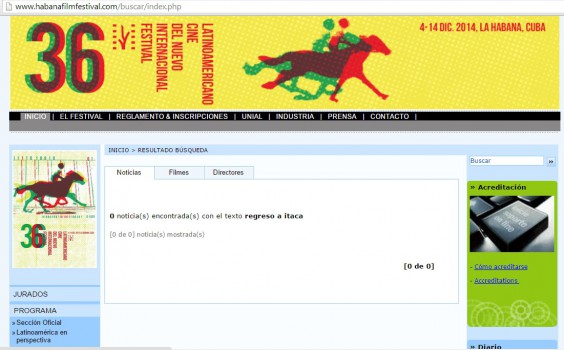For Cuba, There is No Return to Ithaca
by Orlando Luis Pardo Lazo / December 29, 2014 / No comments
Return to Ithaca, a film about Cuban friendship and disenchantment, was removed from Havana’s Latin American Film Festival.

No mention of Return to Ithaca on Havana's Latin American Film Festival website. Photo provided by the author.
Almost fifteen years into a new century and millennium, and Cuba cannot help but behave like a decrepit old nation. The government in Havana insists on wearing a guise of political reformism, openness, and transparency, disguising itself as a less repressive regime.

- Is it worth-while to focus on the last images and letters coming from the inside of the last living utopia on Earth? Is Cuba by now a contemporary country or just another old-fashioned delusion in the middle of Nowhere-America? A Cold-War Northtalgia maybe? Can we expect a young Rewwwolution.cu within that Ancien Régime still known as The Revolution? I would like to provoke more questions than answers.

- Orlando Luis Pardo Lazo was born in Havana City and still resides and resists there, working as a free-lance writer, photographer and blogger. He is the author of Boring Home (2009) and is the editor of the independent opinion and literary e-zine Voces.
Now, the long arm of Cuban censorship has fallen on Return to Ithaca, a recent movie release from the esteemed French director Laurent Cantet. The movie came to Cuba after already winning this year’s El Abrazo prize at the Biarritz Film Festival, and the Venice Days Award at the Venice Film Festival. The picture was actually shot in Cuba, with official permission from the minister of culture. It even appeared in the program for the 37th Havana Film Festival, which took place over ten days in December.
Return to Ithaca takes place on one long night in Havana: a group of friends who have not seen each other since their youth reunite. One member of the group, who has been living in exile in Spain, has decided to return to Cuba in order to change things in the country. The script is based on an episode described in Leonardo Padura’s 2001 book, La novela de mi vida (The Novel of my Life). Padura, who won Cuba’s National Prize for Literature in 2012, is probably one of the best-known Cuban writers still living on the island.
The French-Cuban film boasts some first rate actors: Isabel Santos, Néstor Jiménez, Fernando Echevarría, Alberto Pujols, Pedro Julio Díaz and Jorge Perugorría. Perugorría is well known for playing the lead in Fresa y Chocolate (Strawberry and Chocolate), a movie that was shown on Cuban television only once since 1995, by one local TV network. From a roof terrace in Havana, a city as beautiful as it is devastated, these close but somewhat estranged friends stir up the laughter and tears of a people that has seen its country held hostage by the military elite. Hence the Castroist censorship.
A few months earlier, in an interview with TeleSur during the San Sebastián Film Festival, Jorge Perugorría claimed, “Cuban cinema needs this movie.” He said Return to Ithaca was the “catharsis of a generation” for “a Cuba that would have been but never will be again,” and that, in order to “reinvent itself and create new dreams and create a new Cuba, the country must also look back through the past.”
As tends to be the case in Cuba, where the Communist Party has a monopoly over the press, there has been no mention of the movie’s censorship. Since the government made the horrendously arbitrary decision to ban the movie, none of the Cubans involved in the making of the film — not even Perugorría himself — have spoken out publicly. For a nation of captive-citizens, caution is an instinct to protect oneself from the state’s despotism, in the cultural field as well as in politics.
Iván Giroud, director of the Havana Film Festival, sent an official letter of invitation to Return to Ithaca’s French producer, Didar Domehri, asking to exhibit the film at the festival. Later, under pressure from someone or somewhere, Giroud rescinded his invitation by email, claiming that the entire section on Foreign Films on Latin American Themes had been cut from the festival. In actual fact, films from close to twenty countries – including other French productions — were shown in the Contemporary International Panorama section.
Return to Ithaca is currently circulating underground in Havana, available in a non-commercial digital format. It is being sold on the black market along with many other foreign movies and TV series that could otherwise never be seen on the island, even though 56(!) years have now passed since the beginning of the Revolution that was supposed to “liberate” the workers.
Laurent Cantet has said that he was not trying to use his work to judge the Cuban regime, but rather to “let the Cuban people speak,” since “when they reached the age at which they might have aspired to exert their own influence over the way their country is run,” they came up against a “fossilized power” and “many Cubans felt dispossessed.”
For his part, Leonardo Padura said last summer that Return to Ithaca was “the story of a broken generation, a true account of survival,” and that, as a result, many people would identify with the movie.
But it seems that the gerontocracy of the Plaza de la Revolución had other ideas: no one would identify with anything except for a blind ideology that is obsolete to the point of obscenity. Returning to our Ithaca-island is impossible. The Revolution will endure for as long as the last of its revolutionaries — all now octogenarians — still live.
On December 22, 2014, an open letter, signed by 12 Cuban intellectuals, was released protesting the censorship of the film. You can read the letter here.




